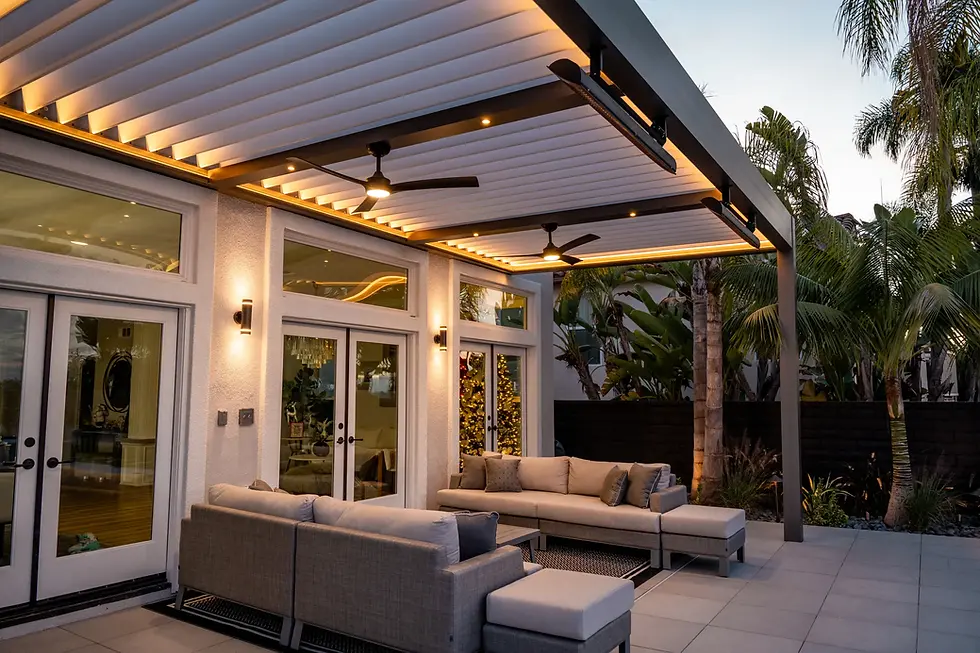Gas, Water, and Electricity Line Connections for a BBQ Area During Paver Installation in Newport Beach
- Sep 22, 2025
- 3 min read
When homeowners in Newport Beach decide to build an outdoor BBQ area, they often focus on the big picture—the paver patio, the grill island, the seating. But what many don’t realize until late in the process is that the real magic of an outdoor kitchen lies beneath the surface. Gas, water, and electricity lines turn a simple grill station into a fully functional outdoor living space.
If you’re planning pavers and a BBQ area, here’s what you need to know before running those lines.

Why Plan Utility Connections Before Laying Pavers
Imagine spending thousands on a new patio only to cut it open weeks later to add a gas line. That’s exactly what happens when utility planning isn’t part of the initial design. The smart approach is to plan trenches for gas, water, and electrical conduits before compacting the paver base.
Running utilities during the paver installation stage saves labor, prevents rework, and ensures everything is cleanly tucked away under the surface.
Gas Line for Your Grill or Fire Feature
Natural gas vs. propane: In Newport Beach, many homeowners tap into their home’s natural gas line for a permanent BBQ or fire pit. Propane is easier but requires regular tank refills.
Pipe type: Gas lines are typically installed with approved materials such as black iron pipe or CSST (corrugated stainless steel tubing).
Depth: Gas lines usually need to be buried at least 18 inches deep, sleeved in conduit if running under pavers.
Permits: The City of Newport Beach requires a permit and inspection for any new or extended gas line. A licensed plumber must perform the work to code.
Water Line for Sinks and Prep Areas
Cold water only or hot and cold: A simple sink may only need cold water, but some homeowners choose both for full convenience.
Drainage: Don’t overlook the drain. Options include connecting to the home’s sewer line (permit required) or using a dry well for limited use.
Freeze protection: Newport Beach’s mild climate doesn’t usually require winterization, but pipes should still be insulated where possible.
Permits: Any new water supply or drain line will require a plumbing permit through the city.
Electrical Line for Appliances and Lighting
Uses: Refrigerators, outdoor lighting, ceiling fans, outlets for blenders or speakers.
Conduit: Electrical lines must be run in PVC conduit rated for underground use.
Depth: Typically 18 inches deep for residential circuits.
GFCI protection: All outdoor outlets must be GFCI-protected for safety.
Permits: Electrical permits are required, and a licensed electrician should pull them.
Coordination With Paver Installation
Here’s how the process usually unfolds:
Design phase: The contractor, plumber, and electrician coordinate utility locations with the patio layout.
Trenching: Before the base is installed, trenches for gas, water, and electrical are dug.
Line installation: Licensed trades install and pressure-test lines.
Inspection: City inspectors review work before trenches are backfilled.
Paver installation: Once utilities are cleared, the paver base and surface go in, leaving a clean, finished look with utilities hidden below.
Common Mistakes to Avoid
Skipping permits: Unpermitted utility work can lead to fines, failed inspections, or even insurance issues later.
Improper depth or materials: Shallow trenches or non-rated pipe/conduit can fail over time.
Poor planning: Forgetting outlets or future features (like a pizza oven or heater) means tearing up pavers later. Always design for growth.
Final Thoughts
A BBQ area with built-in gas, water, and electricity takes outdoor living to the next level. But the key to doing it right in Newport Beach is planning utilities at the same time as your paver installation—with permits in place and licensed professionals on the job.
That way, when you light the grill, rinse the dishes, or flip on the lights for your first party, everything works seamlessly—and your patio stays flawless.
%20(1).png)



Comments